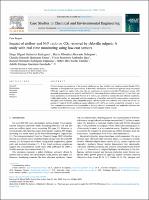Impact of airflow and N/P ratio on CO2 removal by chlorella vulgaris: A study with real-time monitoring using low-cost sensors

View/
Author(s)
Gutierrez Rodriguez, Diego Miguel
Alvarado Orbegoso, María Albertina
Quiñones Cerna, Claudio Eduardo
Azabache Liza, Yrwin Francisco
Rodriguez Espinoza, Ronald Fernando
Robles Castillo, Heber Max
Guerrero Escobedo, Adolfo Enrique
Date
2025-05-19Metadata
Show full item recordPublisher
Elsevier
Journal
Case Studies in Chemical and Environmental Engineering
Abstract
Climate change represents one of the greatest challenges we face globally, and reducing carbon dioxide (CO2)
emissions is among the most urgent actions. In this study, we explored an alternative approach using microalgae
(Chlorella vulgaris) to capture CO2 from the air, employing an Arduino-controlled biofiltration system with
accessible sensors such as the MQ-135 and TESTO 535. We tested different airflow rates (50, 75, and 100 L per
hour) and nutrient combinations (N/P ratios of 0, 108.33, and 216.67) to identify the most efficient conditions.
Unlike other studies, we integrated real-time monitoring of variables such as CO2 concentration, temperature,
and light within a modular, easily adaptable system. The best results were achieved with a flow rate of 100 L/h
and an N/P ratio of 216.67, yielding a capture efficiency of 34.88 % and a daily productivity of nearly to 1 g/L.
This proposal demonstrates that it is possible to develop effective, economical, and replicable solutions that
combine accessible technology and biotechnology to help mitigate climate change.
Type
info:eu-repo/semantics/article
Rights
info:eu-repo/semantics/openAccess
Language
eng
Collections
- Ingeniería Ambiental [98]

